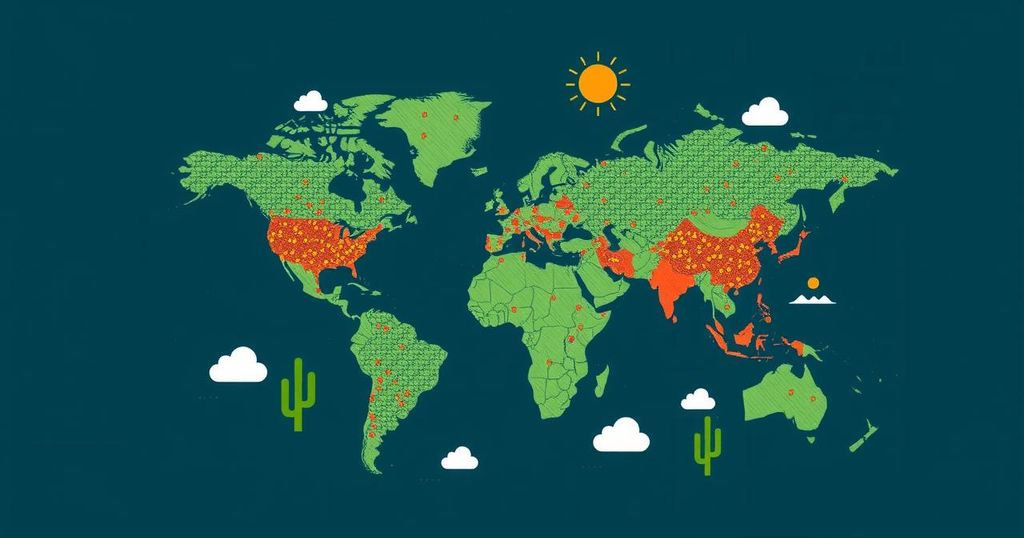A new report highlights that climate change is inflicting unprecedented health risks across the globe, with experts emphasizing that delays in action are costing lives. Key indicators tracked show record increases in extreme weather events, elderly heat-related deaths, and rising food insecurity. As the planet faces its hottest year, this report arrives ahead of COP29 and amidst significant political developments in the United States.
PARIS — A substantial report published on Wednesday elucidates that climate change is increasingly jeopardizing human health through unprecedented means. Experts caution that “wasted time has been paid in lives.” This report emerges amidst a backdrop of extreme weather conditions, including heat waves, wildfires, hurricanes, droughts, and floods, as 2023 is poised to become the hottest year recorded. Moreover, it is timely, occurring just weeks prior to the 29th United Nations Climate Change Conference (COP29) set to convene in Baku, Azerbaijan, and shortly before the upcoming United States elections, which may potentially reinstigate climate skepticism with the re-election of Donald Trump to the presidency. The eighth edition of the Lancet Countdown on health and climate change, prepared by a consortium of 122 experts, many of whom are affiliated with UN agencies such as the World Health Organization, presents a disturbing overview of mortality and procrastination in addressing these issues. The findings indicate that of the 15 indicators the specialists have been monitoring over the past eight years, ten have reached alarming new heights. These indicators encompass the escalation of extreme weather incidents, increased mortality rates among the elderly due to heat exposure, the proliferation of infectious diseases, and food insecurity caused by severe droughts and floods affecting agricultural output. Marina Romanello, the Executive Director of the Lancet Countdown, informed Agence France-Presse (AFP) that the report reveals “record threats to the health and survival of people in every country, to levels we have never seen before.” Notably, fatalities among individuals aged 65 and older due to heat-related conditions have surged by 167 percent since the 1990s. Furthermore, rising temperatures have expanded the geographical range of mosquitoes, consequently facilitating the spread of deadly diseases, exemplified by a record high of over 5 million dengue cases worldwide in the previous year. The report highlights a concerning trend of environmental degradation, with approximately 5 percent of the planet’s tree cover lost between 2016 and 2022, severely diminishing Earth’s capacity to absorb carbon dioxide emissions generated by human activity. It also scrutinizes the actions of oil and gas corporations, alongside specific governments and financial institutions, which are reportedly “fueling the fire” of climate change. Despite long-standing warnings, the World Meteorological Organization reported that global emissions of primary greenhouse gases have once again escalated last year. Top oil and gas companies, which have reported record profits, have also increased fossil fuel production. Moreover, many countries have issued new subsidies for fossil fuels in response to surging oil and gas costs following Russia’s invasion of Ukraine in February 2022.
The issue of climate change is increasingly recognized as a direct threat to public health globally. A growing body of evidence indicates the deleterious effects of climate change on health, including the exacerbation of air pollution, the increase in heat-related illnesses, and the rise of vector-borne diseases. With the projections of more frequent and severe extreme weather events, with accompanying impacts on food and water security, understanding the correlations between climate change and health outcomes is critical. Major reports, such as the Lancet Countdown on health and climate change, compile data from multiple experts to provide a holistic view of how climate crises are influencing health indicators worldwide, making the urgency of sustainable action all the more pressing as international summits loom.
In conclusion, the recent report underscores an alarming reality: climate change is leading to unprecedented health threats globally, with a multitude of indicators reflecting this dire situation. The rising toll on human life, particularly among vulnerable populations, coupled with environmental degradation, presents a clarion call for urgent action across governments, industries, and communities. As the world braces for critical climate discussions in the near future, the need for constructive and decisive measures to curtail emissions and mitigate health risks cannot be overstated.
Original Source: www.manilatimes.net






